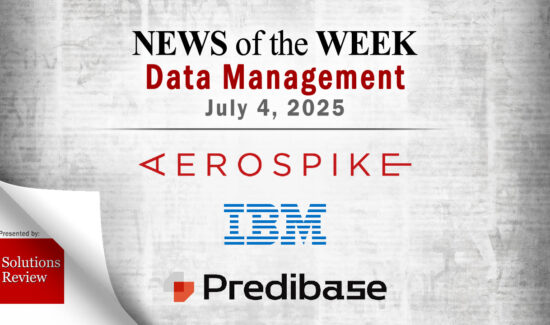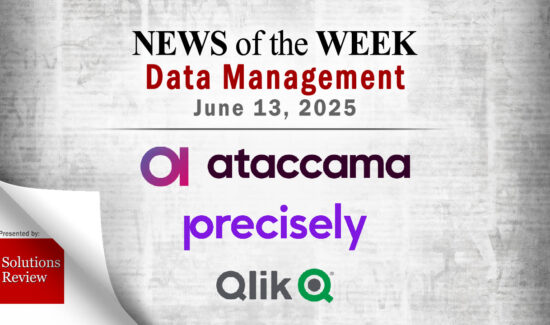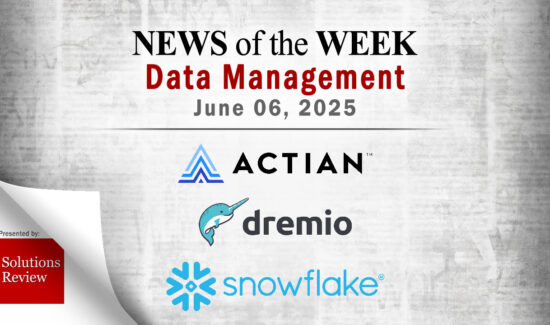2020 CRN Big Data 100: 12 Database System Companies to Consider


IT news and analysis outlet CRN recently released its 2020 (and eighth annual) Big Data 100, a ranking of prominent big data technology vendors that solution providers should be aware of. The list is made up of established and emerging big data tools vendors. The list is broken down into five distinct product categories that include business analytics, database systems, data management and data integration software, big data platforms, and data science and machine learning tools.
CRN pre-published a list of The Coolest Database System Companies included in the overall list via an interactive slideshow. Though the Big Data 100 is aimed at highlighting software vendors for the purposes of solution provider partnering, Solutions Review is most interesting in highlighting the vendors from that offer unique products and platforms for enterprise organizations. As such, we’ve read through CRN’s complete rankings, available here, to analyze the trending database system companies we think matter most. For an even deeper breakdown of database management software, tools, vendors and platforms, consult our popular Buyer’s Guide.
Couchbase
Couchbase offers Couchbase Server, an open source distributed multi-model NoSQL document-oriented database software package that was designed for interactive applications. Couchbase can be clustered from a single machine to very large-scale deployments spanning many machines. The product also provides simple scaling key-value or JSON document access with low latency and high sustained throughput.
DataStax
DataStax offers a distributed hybrid cloud database built on Apache Cassandra. The company’s flagship product is DataStax Enterprise, a solution that makes it easy for enterprise to exploit hybrid and multi-cloud environments via a data layer that eliminates complexity associated with deploying applications across multiple on-prem data centers or multiple public clouds. Its enterprise data layer eliminates data silos and cloud vendor lock-in and powers mission-critical applications.
EnterpriseDB
EnterpriseDB offers data management tools based on the open source database PostgreSQL. The vendor develops and integrates performance, security and manageability enhancements into PostgreSQL to support enterprise workloads. EnterpriseDB has also developed database compatibility for Oracle to facilitate workload migrations from Oracle to EnterpriseDB. The Postgres database is available via subscription in two different options, and includes tool suites, upgrades, support and maintenance.
Exasol
Exasol offers an in-memory analytics database that is among the fastest in the industry, according to the TPC-H industry benchmark for evaluating performance. The product features columnar compression and storage, as well as massively parallel processing. Its standard SQL interfaces provide simple compatibility with pre-existing applications and data structures. Exasol also includes support for Hadoop. Exasol is best suited for real-time big data reporting, analysis, and advanced analytics.
InfluxData
InfluxData offers an open source time-series database called InfluxDB. It is written in the Go programming language and optimized for high-availability storage and time-series data in fields like operations monitoring, application metrics, Internet of Things sensor data, and real-time analytics. InfluxDB features built-in time-centric functions for querying a data structure composed of measurements, series, and points, with each point consisting of key-value pairs called the fieldset and timestamp.
MarkLogic
MarkLogic offers an operational and transactional enterprise NoSQL database that is designed to integrate, store, manage, and search for data. Organizations can ingest structured and unstructured data with a flexible data model that adapts to changing data. It also natively stores JSON, XML, text, and geospatial data. MarkLogic’s Universal Index enables users to search across all data, and APIs enable application development and deployment. The database has ACID transactions, scalability and elasticity, and certified security as well.
MariaDB
MariaDB is an open source and commercially supported fork of the MySQL relational database management system. It was developed by the original creators of MySQL and turns data into structured information in a wide array of applications. MariaDB features an expansive ecosystem of storage engines, plugins and many other tools. According to the official site, the latest version of MariaDB includes GIS and JSON functionality. The database is supported by Microsoft Azure and Amazon RDS (since 2015).
MemSQL
MemSQL offers a real-time data warehouse that ingests data continuously to perform analytics. The tool can ingest and transform millions of events per day while also analyzing billions of rows of data using standard SQL. MemSQL can be deployed on-prem, in the cloud via Amazon Web Services or Microsoft Azure, or as a service including drop-in compatibility with existing middleware, integration, and BI software. MemSQL is available in two editions: Developer (not for product deployments) and Enterprise.
MongoDB
MongoDB is a cross-platform document-oriented database. It is classified as a NoSQL database program, and uses JSON-like documents with schema. The software is developed by MongoDB and licensed under the Server Side Public License. Key features include ad hoc queries, indexing, and real-time aggregation, as well as a document model that maps to the objects in your application code. MongoDB provides drivers for more than 10 languages, and the community has built dozens more.
Neo4j
Neo4j offers a graph database that helps organizations make sense of their data by revealing how people, processes and systems are related. Neo4j natively stores interconnected data so it’s easier to decipher data. The property graph model also makes it easier for organizations to evolve machine learning and AI models. The platform supports high-performance graph queries on large datasets as well.
Redis Labs
Redis Labs is best known for its Redis Enterprise, a database product that takes advantage of modern in-memory technologies like NVMe and Persistent Memory to provide deployment over cloud and on-prem data centers. The solution features native data structures and a variety of data modeling techniques such as streams, graph, document and machine learning with a real-time search engine. Redis has also had considerable success entering strategic partnerships with vendors such as Pivotal and Red Hat.
Splice Machine
Splice Machine is an open source database management system that is powered by Hadoop and Spark. Key features of the software include ANSI SQL-99 coverage, ACID transactions with Snapshot Isolation semantics, in-place updates that scale from one row to millions, and secondary indexing in both unique and non-unique forms. One of Splice Machine’s building blocks is Apache HBase.




















